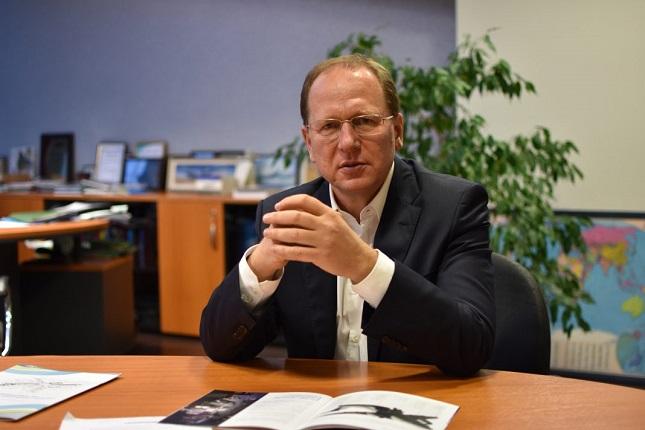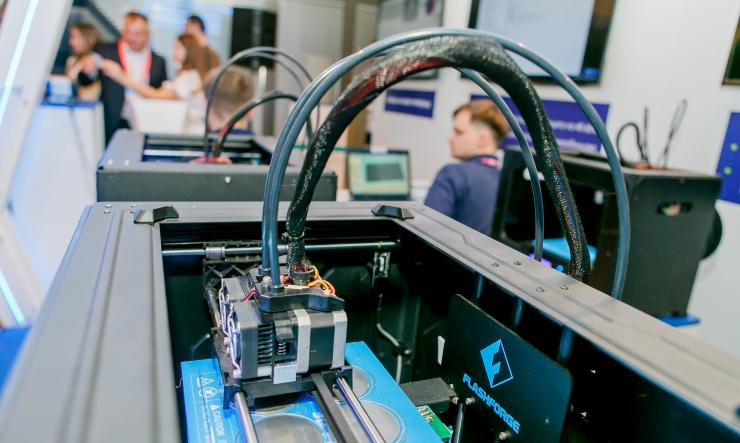FLIGHT ENTERPRISE

Oleg Shcherbatenko and his colleagues were pioneers in the automation of the largest enterprises in Ukraine
What would you say if your equipment was not repaired after its breakdown, but before? Yes, now the machine is working properly, but in the future it has already broken. When and what exactly fails, monitors a number of sensors that analyze the "health" of the necessary equipment and prevent its breakage.
Or the metallurgical industry. In a difficult situation, the foreman tries shout his boss until he is heard in a noisy room. Another thing is when the boss can see the problem at the same moment, through the eyes of his subordinate. Or rather, with the help of Google Glass that are on the nose of a particular employee.
This is only part of the technologies that are involved in the company IT-Enterprise Oleg Shcherbatenko. She is one of the pioneers in the Ukrainian high-tech market. Shcherbatenko and his colleagues started their work on the first enterprise management programs when each of these words was neologism - in the mid-1980s.
Its ocean
How does the reader of this article imagine Soviet computers? Huge silvery cupboards surrounded by Soviet engineers in white coats. “How are the devices there?” - “Fifteen!” - “What signify fifteen?” - “And what signify devices?” – an eternal dialogue is heard. The background plays a melody from the movie "Through thorns to the stars", by close-up - a cupboard with a disc spinning in it. The absence of obscene words on the cabinet is typical for the object of worship of all techies - the computer.

Yes, indeed, such a presentation is not far from reality. Halls with huge (especially in comparison with modern computers) cupboards of the Mainframe system worked as separate enterprises servicing Soviet industrial facilities. In the 1980s, companies sent the collected data files to common computer centers, where people in white coats prepared analytics for the industry. Having received it, the enterprises calculated their work for the next month.
IT-Enterprise occupied the niche of automation of large enterprises.
The development of such programs were engaged in the design office, in which, after graduation from the Kiev Polytechnic Institute, worked Oleg Shcherbatenko. “In the 1990s I defended my thesis, shoveled a huge number of foreign sources. Even then, world science was actively sharing information. Learning innovative experience was important then and today. Every year we develop, see what is happening in the world, what approaches are used,” he recalls how it all began.
The situation in the industry changed with the advent of personal computers in the early 1990s. Desktop computers, winning in size and performance, quickly became an indispensable element of any office. In addition, the technical re-equipment of enterprises was driven by a changed paradigm of relations in the market. Post-Soviet enterprises gradually moved from mass production to work on specific orders.
Seriality, by virtue of its stability, did not require operational analytics, but the work on order from different customers and with different parameters needed quick reports. “Computers were put on work places not only in offices, but also in manufacturing and warehouses, a network was formed. In a single system were designer, technologists, economists, accountants and managers. And, of course, then was the first revolution. This revolution was in the approaches”, Shcherbatenko recalls.
The development team did not start from scratch, and this soon became its biggest advantage. For example, after the collapse of the Soviet Union, most of the techies went to trade on the market, but Shcherbatenko and the team decided to continue their work. They had everything for a successful reboot: experience in the system design bureau and the client base of large companies with which they cooperated in the late 1990s.
It was the choice of the modernization niche of large industrial manufacturers that became a strategic factor for the success of the Shcherbatenko team. While the majority of software developers for business focused on fast-growing trade, innovators from KPI plowed open spaces of their own “blue” ocean. “A lot of IT-companies engaged in trade and accounting, and we were engaged in production. Therefore, the majority looked at us as if people were “incompatible with reason”, Shcherbatenko says.
Rumors about the death of the industry of post-Soviet Ukraine turned out to be somewhat exaggerated. Many large factories stopped. Only the few that were truly solvent remained: someone had already been trading with foreign countries, someone had received long but profitable government contracts. Working without automating business processes was standee increasingly difficult.
For example, one of the first customers was the 45th Experimental Mechanical Plant, located in Vinnitsa. He was one of the leading manufacturers means of transportation, refueling, pumping and storage of petroleum products and remained a solvent customer even during the upheavals of the 1990s. “We didn’t have a goal to sell our program at 1000 kiosks, it was better for us to find one customer for 1000 workstations. And then the cost of the project was significantly higher”, the developer explains the logic.
System work
Permanent crises changed the relief of the Ukrainian market almost every month. The average life of companies of similar profile barely reached several years. The main problem of market participants was that, by becoming attached to one large customer, they risked either dying with him or joining his structure as the IT department. Oleg Shcherbatenko clearly understood: business must be diversified. He moves away from the highly specialized purpose of his system and builds a universal system that can be adapted to any customer requirements.
By that time, the Ukrainian team had already competitors. Russian companies, the developers of Parus, Galaktika, 1C, were active on the market, and emissaries from world giants SAP and Oracle came to the Kiev from West. “We installed system of each our competitors and disassemble them to small screws, studied the algorithms,” Shcherbatenko says. - They had many things, but there was no such knowledge of the local market as ours. We have learned to think like our customers, understand their problems and offer the product they need. Improving the quality of products, you conquer the market".
«We have learned to think like our customers»
This allowed IT-Enterprise to implement more than 300 large projects. For example, the system of “smart production” - SmartFactory - was launched at the Ukrainian industrialists: “Interpipe”, “Zorya” - “Mashproject”, and on such innovative enterprises as the Kharkov factory “FED”, which produces unique components for the aerospace industry. The IT-Enterprise system regulates all the necessary issues in the work of enterprises - from production to HR.
As a result of introducing a system for predicting breakdowns at Nizhnedneprovsk Pipe Plant, which is part of the INTERPIPE holding, the cost of carrying out scheduled repairs has decreased by $2 per ton of output — that millions of savings in scale production.
Having mastered her own market, the company began to occupy adjacent
The project with the Kharkov factory FED, with which IT-Enterprise has been working since 2011, has become even more revealing. For the last five years, FED has been actively developing, the annual growth of turnover reaches 30–70%. The plant is now operating in three shifts. However, this is a result of the introduction of technology, and before that there were problems with the timing of orders and the reduction of product quality. Now the company not only processes are automated, but also all key indicators are tracked in real time. The system works on the search and optimization of bottlenecks. As a result, the production cycle decreased by 25%, last year's turnover amounted to 1.5 billion hryvnia, and the company itself saved about $400,000 of credit funds for the purchase of new equipment. The effect of timely deliveries is even greater - FED managed to attract orders from world aircraft manufacturers for $ 90 million. “The number of orders for new types of products is constantly growing. Without a production management system (that is, in manual mode), we simply could not plan such a number of operations”, says Dmitry Shigalevsky, technical director of FED.
Accountant's Day
In a large b2b business, the best advertising is customer recommendations and results. Thanks to word of mouth, IT-Enterprise attracted new projects and that helped withstand the 2009 crisis. According to Shcherbatenko, the crisis has taught business to save money and time. It forced many to automate their processes as much as possible. “When in 2009 the companies switched to a two-day working week, the business seriously thought about the implementation of management systems. Everyone thought like this: we used to have a margin of 20%, now it is 3%, and how to survive now? We need a system! ”- the CEO of the Ukrainian company describes the thoughts of his clients.

ІT-Enterprise has implemented more than 300 large projects on production
As a result, during the crisis, the demand for IT-Enterprise products has tripled. The crisis not only increased the number of orders, but also cleared the market of competitors. When the waves of turbulence subsided, it turned out that 15 companies leaved the market.
According to IDC research, in 2010 IT-Enterprise became the second in the market of ERP-systems in Ukraine, occupying 15.7% and to give the pas only SAP with her share of 43.4%. The remaining players were content with little - 1C (13.9%), Oracle (11.7%) and Microsoft (6.1%).
Having mastered her own market, the company began to occupy adjacent. In 2011, the first release of the platform for tender purchases SmartTender.biz. By 2018, this IT-Enterprise product has become the largest online trading platform for electronic commerce in Ukraine. More than 90,000 companies operate at the site, and the annual turnover of trades on SmartTender is measured in hundreds of billions of hryvnias. SmartTender.biz is also the official tender platform for the ProZorro electronic public procurement system.
Last year, the company released the accounting program MASTER. The premiere of the Ukrainian product was the response of IT-Enterprise to a ban on a similar Russian - “1C: Accounting”. The market for accounting products is very complicated. According to Oleg Shcherbatenko, all commercial companies that used 1C are in no hurry to part with old habits: “We were optimistic that after the ban on 1C, everyone would urgently start looking for and introduce Ukrainian products, but this did not happen. We win the market with our quality”.

IT-Enterprise — one of the few who develop applications for Google Glass
Apparently, they does it: now MASTER solutions employ more than 1000 users.
Overtaking the world
To follow the trends - that is well, to outstrip - much better. Something like this can describe the current work of the company team. This is one of two motivational components in IT-Enterprise. “The first is, of course, money: IT specialists are now very expensive. The second part is value motivation. If you made a product that is ahead of the whole world, this is a very motivating factor, ”says Oleg Shcherbatenko.
In 2018, Ukrainians became partners with Google in the development of production solutions using the Google Glass Enterprise Edition headset among just 30 other companies in the world. In Kiev, quickly found use for the innovations of their fellow countryman Sergey Brin. Now this technology helps to solve problems in of plant workshops of FED.
“Imagine - you see the problem, you fixed it with Google Glass. Together with you, the senior manager sees this problem. If necessary, he begins to direct your actions through Google Glass, - explains the principle of work Oleg Shcherbatenko. - Now the world is changing so that you do not know what will happen tomorrow. We must outstrip the trends”.